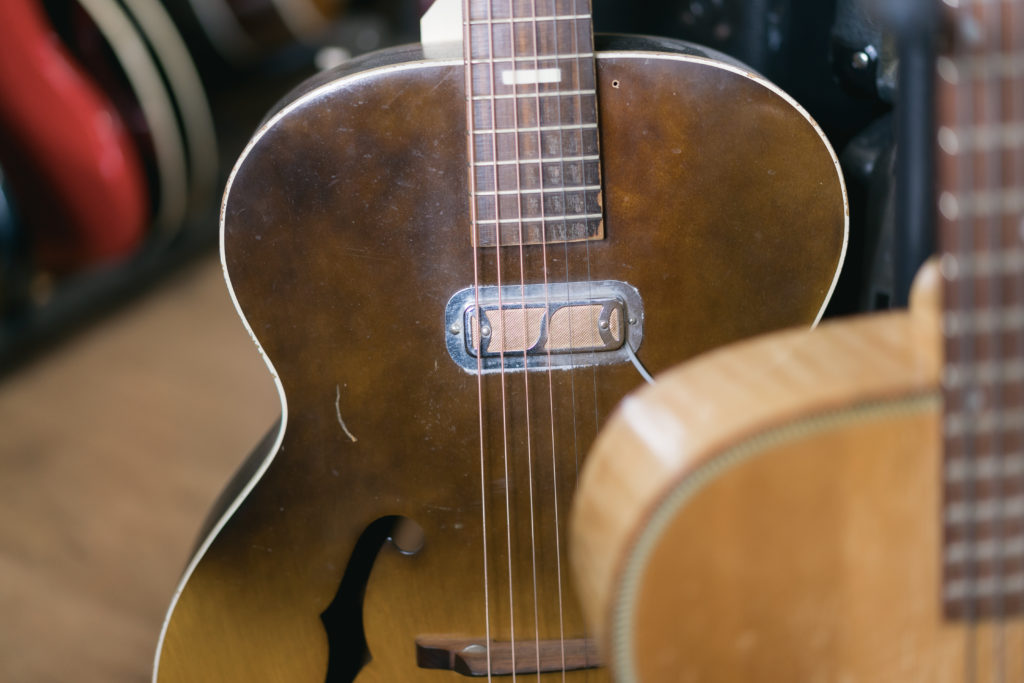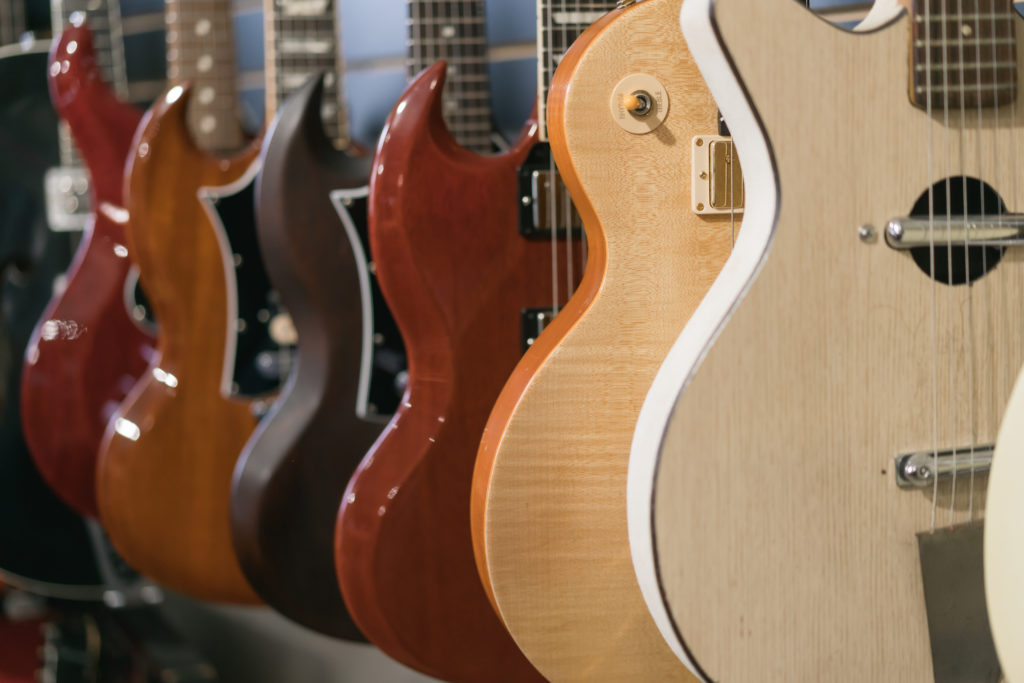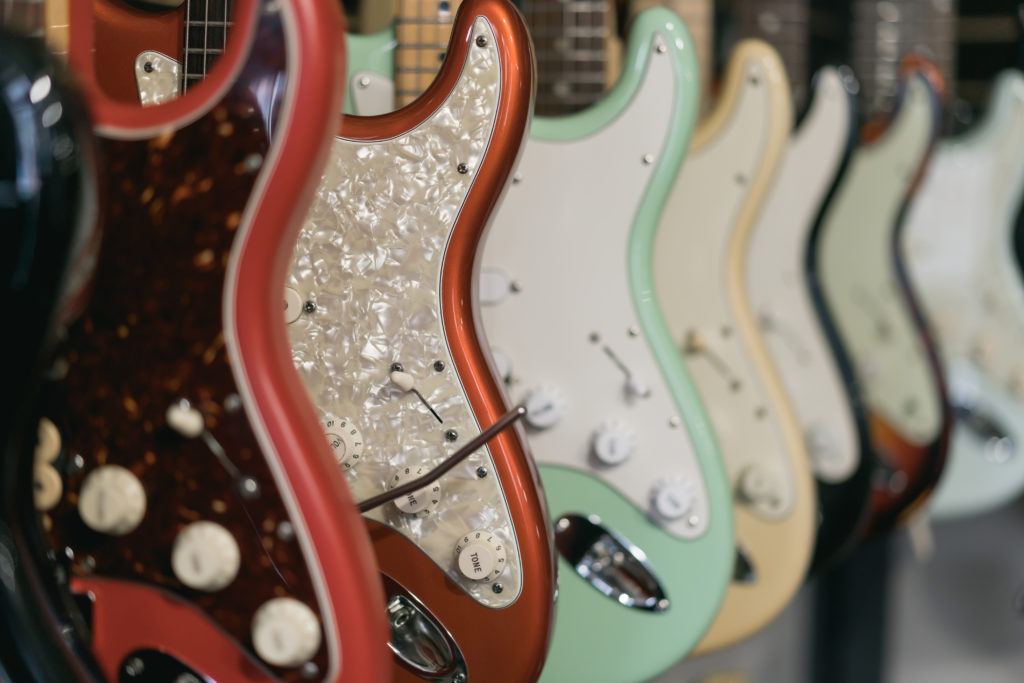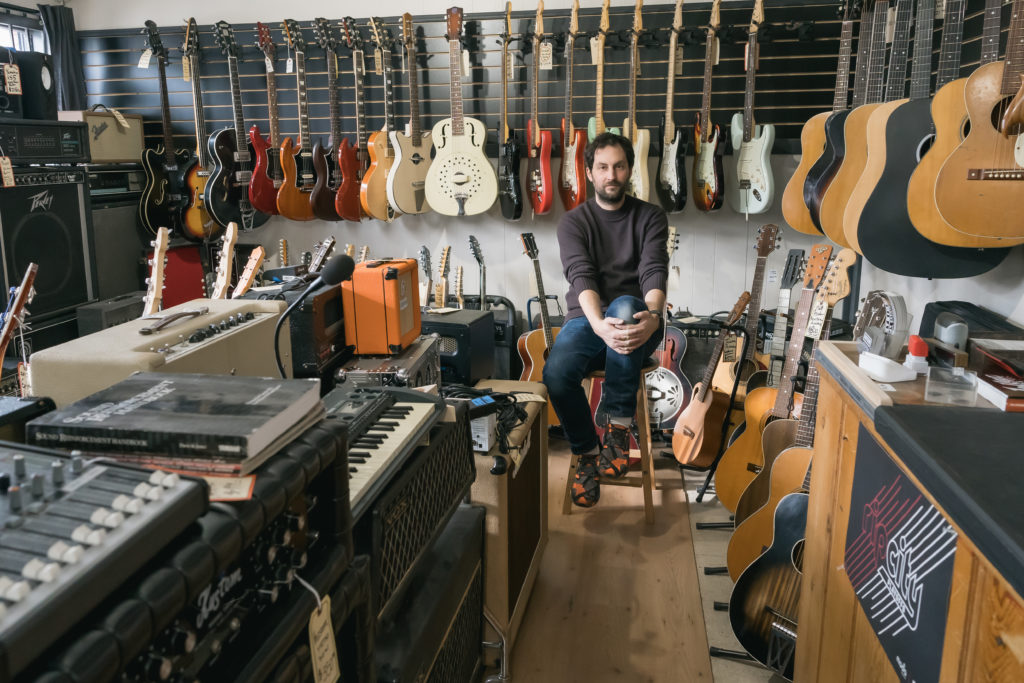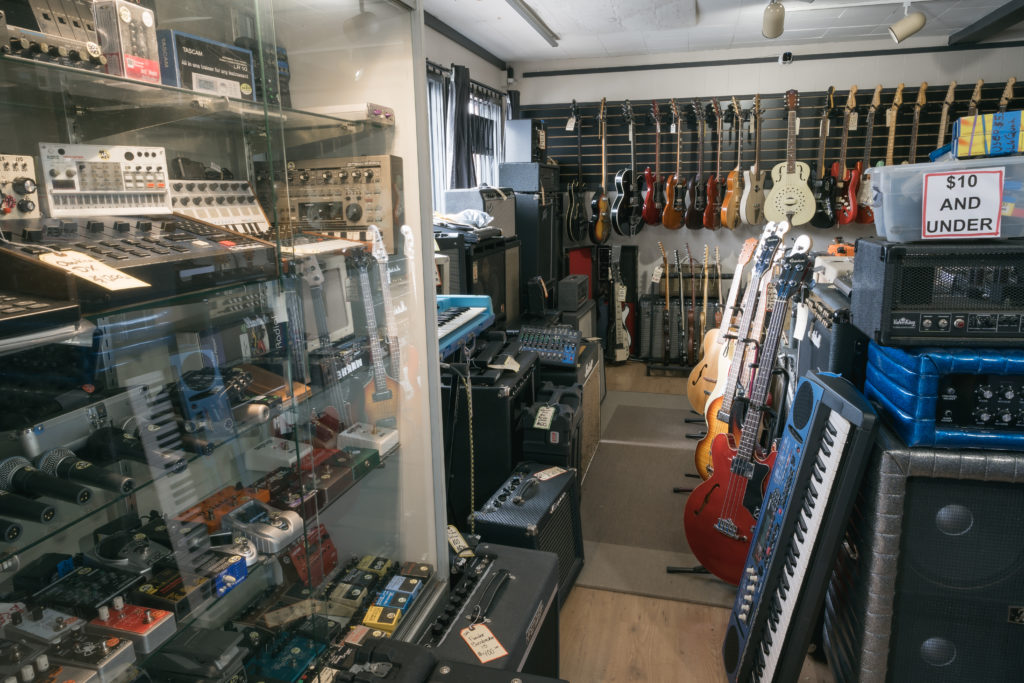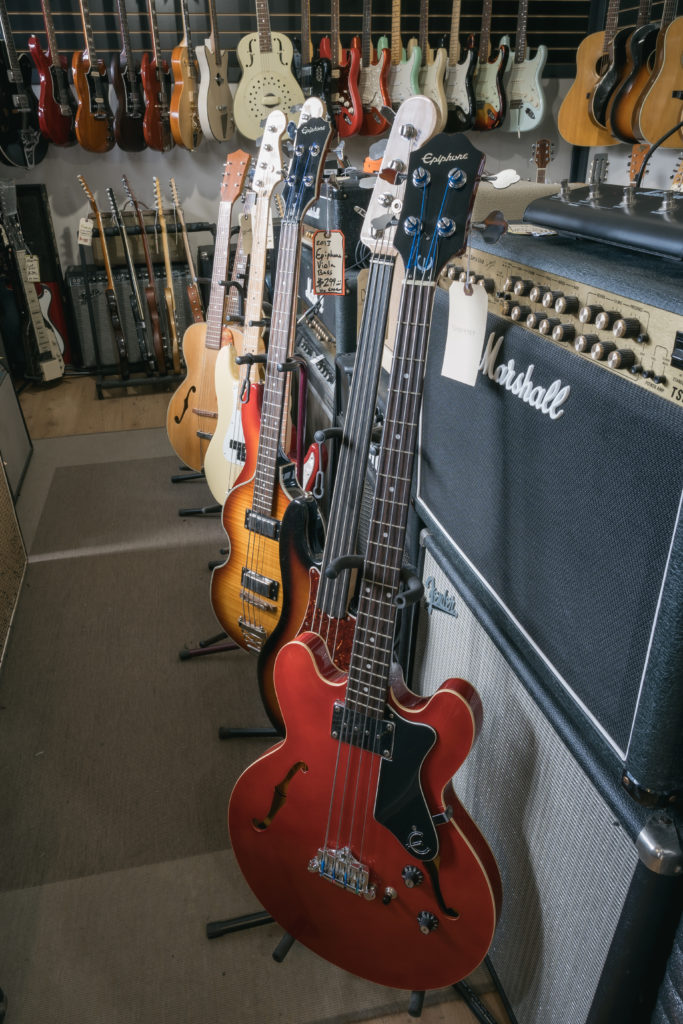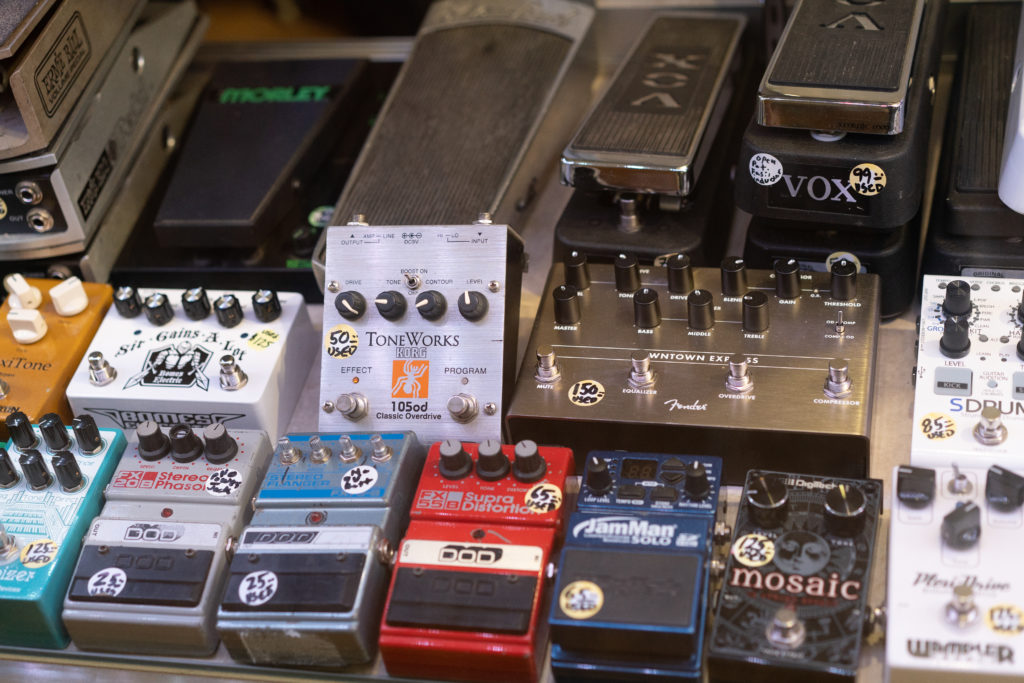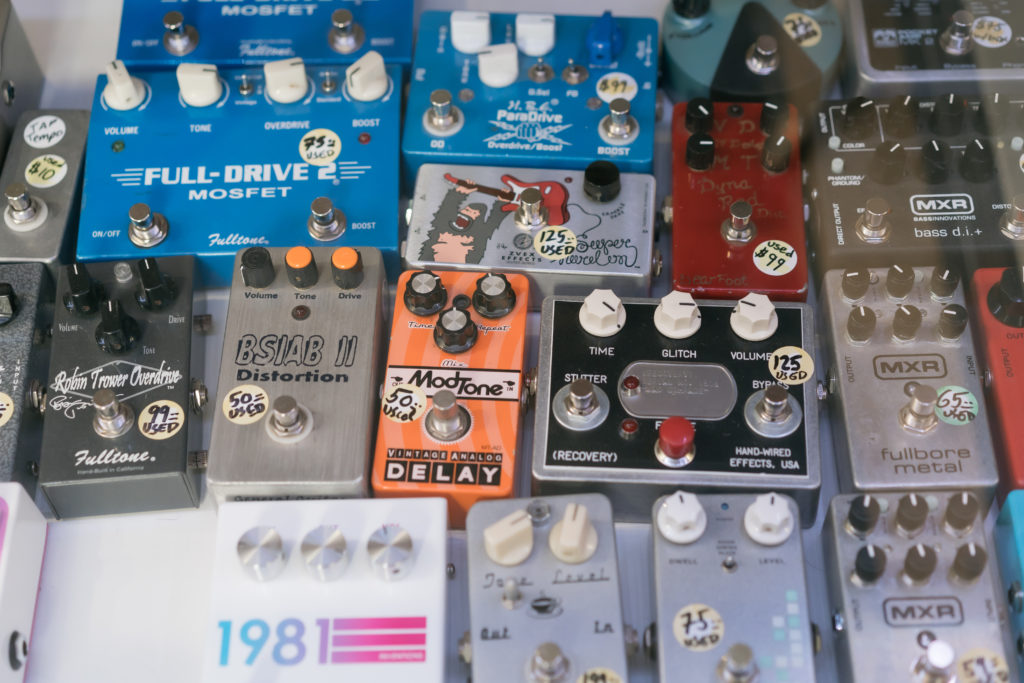Hank’s Music Exchange is a shop for the community.

Imagine a shop where somewhere among the collection of things, there might be that one thing you were looking for all along. On Hawthorne and 34th, there’s a place where that’s still possible. That shop is Hank’s Music Exchange, run by longtime Portland gear guru Hank Failing, out of the same space as Eastside guitar repair.
Eastside Guitar Repair is its own remarkable place, run by owner and luthier Ryan Lynn, who’s there in the back as I walk in, giving a client’s guitar the once-over with the casually thorough gaze of a true master. Luthiery is a kind of knowledge that borders on the arcane, requiring an artist’s eye and craftperson’s precision, half woodworking and half electrical engineering, and Lynn exudes that energy with humility, though Hank is quick to tell me that Lynn is the best in the city at what he does.
In a similar, slightly goofier way, you can tell that Hank has the same depth of knowledge, though his field is the larger world of gear–of guitars and basses, but also of pedals and synths and amps and drum machines–of all the objects so important to modern musical expression, in all their esoteric technical glory. It’s often overlooked how important these objects have been to the development of contemporary music, and the ways in which various iconic instruments and effects evoke the particular character of musical eras, but any student of the history of gear would tell you that the social production of music is intrinsically linked to the tools artists have available to them. Hank Failing is such a historian, though he might tell you that he’s just a guy who’s been playing with this stuff his entire life.
Hank grew up here in Portland, and speaks about about the legendary PDX venue La Luna, which shut its doors in 1999, as an impetus for his lifelong obsession. “My friends and I went there when we were 15 or 16, we saw Radiohead there for $2. It was their first US tour, or maybe their second,” he reminisces. “We’d go see bands like Crackerbash and Hazel, and Heatmiser, Elliot Smith’s first band in Portland, or not his first band, but the band he had before he did his solo stuff. La Luna was the place we would go. It was awesome. It was super cool, and it kinda blew me away as a kid, and made me wanna do music, and get a guitar. I’d jam with my friends, and we never had any ‘real bands’ but we were always addicted to buying gear, and it was part of our culture as kids, messing with guitars and pedals.”
That initial spark translated into a long tenure as manager of Old Town Music. “I officially became the manager there in 2005, but you know, I got to make my own decisions and run things at a pretty early age. I started there when I was 20, and my boss, Pat Rice, he basically trusted me to make deals…he saw me making it happen, and was like, ‘ok, do what you gotta do, and just ham it up with people, get to know people.’ I worked there for 22 years, and then when the pandemic happened, that kinda all fell apart.”
Like many, Hank’s career took an unexpected turn with the advent of Covid, but he wasn’t about to abandon what had become his lifelong passion and profession. “I love being a guitar guy, so it’s hard for me to say no to being that guy again,” he tells me with a grin. Instead, he figured, he’d go into business for himself, affording him more control over a model that would fit both his risk tolerance and his personal philosophy toward selling gear.
The exchange does have a website, but Hank has found that aside from in-store purchases, his platform of choice has been social media, specifically instagram, a space that his employee, Katy Black, has helped him navigate. “Katy, from Spoon Benders, she’s super rad, and she’s so much better at that stuff than I am. She’s way more keyed in and way more patient, and honestly just a lot smarter person than I am. She’s great!” Hank is also looking to expand his online presence, but only in ways that make sense. “I would say over the next coming months, customers will start seeing more things for sale on the website, but really we just rage it on instagram, which is awesome…I could tell you that 85 to 90 percent of our sales or buys or trades start on instagram right now. I came up with some docs that makes it very unemotional for people, and gives them a form that feels professional, and breaks it all down, just makes it easy. People do that pretty much every day, they send me pictures of stuff. I’m not doing drums and I’m not doing brass or reeds, or if it’s just too huge for here I’m saying no, but that’s made it really easy to do business.”
Hank is also the kind of guy who makes doing said business easy, by being easygoing himself. “What I love is having a shit-ton of gear for people, so whatever you’re obsessed with, you can get rid of stuff and get this other stuff,” he continues. “Generally my strategy is to price things cheap. I’d much rather have stuff be in and out, and have people know that, ‘dude, you gotta be part of this store if you’re gonna get the deals.’ I don’t want things to sell for top dollar. If things sell for top dollar, it appeals to the people who have the most money, and the people who make the most money aren’t necessarily making the most music. Making money, you gotta do that to make your business work, but you can also make money by getting in and getting out.” As evidence, Hank gestures to a glass case near the door, full of drum machines and controllers. “This Dave Smith drum machine is 1400 bucks, you can go on reverb right now and see them selling for over 2000 bucks, but if someone loves it, it’s 1400 bucks. You just have to be a person and come in here.”
In a world where massive corporate entities can send you anything you could think to want within 24 hours thanks to outsourced supply chains and exploitative labor practices, Hank’s model seems crazily outmoded, but also rare and necessary. His care for the things he sells and his insistence that they get sold function as two parts of the same impulse, which is towards the creation of a larger collective musical community. The foundation to all of this, is, of course, relationships. “There was 22 years of me selling stuff to people and being friends with them, and playing shows,” he says of his history as a fixture on the Portland scene. “For a long time I had a record label called Failing Records, and I would do comps. Each one of those comps I put 2 CDs into, and we’d do 40 or 45 bands, and we did that 5 times, and then I did a comp with Voodoo doughnuts, called Portland Cream, that was a single disc. But if you take 45 bands times how many band members times 5 years, there’s 600 people. It’s easy to have a relationship with somebody in some way doing that…You get to know your customers like family members, like, I know you want a Russian Big Muff, and I just got one, so I send you a message, like ‘dude, it’s 200 bucks because the knobs are changed,’ and you’re like, ‘ok I’ll see you tomorrow. Sweet!’ That kinda stuff, being close with people, because it’s fun. Selling gear is the funnest thing. It’s like, joy for everybody!”
It’s in this spirit that Hank runs his shop, aware of the potential creative energy contained in every guitar, every pedal, and every synth, and operating as though it’s his moral imperative to get those objects into the hands of people who are able to unleash that energy. Hank’s Music Exchange is fueled by a desire to serve as a conduit through which all these things pass as they travel the circuits of Portland’s music scene, passing from musician to musician until they end up in the hands of the people that love them most, and use them to make the music that we all, in turn, love.
All photos by Sarah Nienaber.


